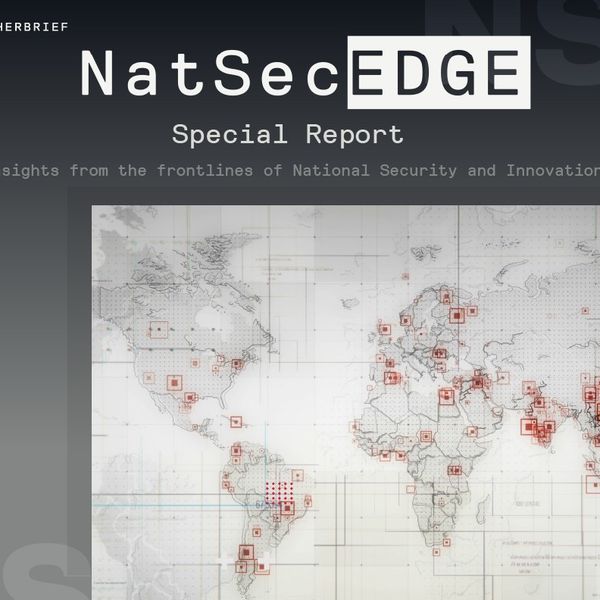The Intelligence and National Security Alliance (INSA) is preparing for one of its biggest events of the year. The non-profit counts more than 160 industry, academic and former government leaders among its membership ranks, all of whom come together to bring unique expertise to the country’s most-pressing national security issues, and interest is growing.
This year’s INSA Intelligence and National Security Summit, co-hosted by AFCEA, has more than double the number of registered government attendees over last year.
The Cipher Brief, which is a media sponsor of this year’s summit, talked with INSA’s Chairman, Letitia ‘Tish’ Long, who served as Director of the National Geospatial-Intelligence Agency from 2010-2014, to discuss INSA’s top priorities and what she hopes will happen at this year’s summit, which is tackling everything from security clearance reform to adversary efforts to spread disinformation ahead of next year’s U.S. Presidential Elections.
[Editor’s Note: Cipher Brief CEO & Publisher Suzanne Kelly will be speaking on a panel on that topic at next week’s conference.]
We started off by asking Long to outline INSA’s latest priorities and where she sees the most urgency, given the complicated nature of today’s threats and the U.S.’ ability to address them.
Long: First, let me say that INSA’s platform is furthering the public-private partnership between government, industry, and academia. We see those relationships getting stronger, I believe, for a couple of reasons. One, the intelligence community and the Department of Defense have recognized, for some time now, that the government is no longer the deep-pocket resource that it once was, and as a result, it is not always at the forefront of developing new technologies and conducting research and development like they once were. A lot of the cutting-edge work and new developments are now done by industry. So that means government needs strong relationships with industry to ensure their priorities are being worked. In order for that to occur, it’s important that there is a constant dialogue. That’s why we co-host (with AFCEA) the Intelligence and National Security Summit. Identifying strong public-private partnerships was one of the DNI’s enterprise-wide objectives and I believe you will be hearing that message from all of the agency directors we have speaking at this year’s summit. Many of them have even established offices to conduct industry outreach.
The Cipher Brief: What is the private sector looking for right now?
Long: They really want to hear from the leadership of the community. What are the priorities of the agencies and organizations in the IC and where do they need help from industry? We will hear from the agency directors as well as the Service intelligence Chiefs - those are two of top panels at the Summit every year - and they will talk to just that. A new addition to the Summit this year is a fireside chat between Michele Flournoy, the former Undersecretary of Defense for Policy and General Joe Votel, recently retired Commander of Central Command. They are going to talk about the importance of intelligence and how the needs of the policymaker and the warfighter are changing.
The Cipher Brief: Where do you see INSA’s priorities falling for next year? What do you see on the horizon?
Long: Our priorities tend to reflect the government’s priorities as well as our industry members’ priorities. One of our priorities, that has unfortunately been enduring, is the issue of security clearance reform. The five-year periodic re-investigation is being replaced with continuous evaluation. In other words, we should be looking at available data streams like banking and credit card information, traffic violations and arrest records. Information that is available and can be analyzed continuously to catch issues in near real time rather than waiting for an arbitrary number of years to review information. As this is being implemented as part of the Trusted Workforce 2.0 initiative there are any number of issues to work through. At the Summit, we will have a panel discussion on Continuous Evaluation: Balancing Security and Privacy.
Another priority for INSA is Cyber and we will have three panel sessions on the topic of Cyber. One on Supply Chain Risk Management, one on Defending Cyberspace and one on Active Cyber Defense - whether or not to hack back. Another area we’re focused on is technology. We are always looking at current technologies and asking how they can they offer their solutions to the enduring issues that the intelligence community and the Department of Defense face. We’re always looking for the potential game changers that are out there that the intelligence community and the Department of Defense need to be focused on and need to be investing in. At the Summit we will have panels on Applications for AI, Government Collaboration with Technology Innovators and Technology Futures.
Another priority for us is concentrating on the workforce of the future. Lately, we have been not only talking about that, but also looking at how you recruit for the workforce of the future. How do you work with colleges and universities to ensure that they are building the curriculum that will deliver the workforce that we will need? How do you recruit? How do you compete with the Amazons and the Googles and the non-government contractor portion of industry? How do you retain talent once you get it? And it’s not just the government workforce that is facing these challenges, it’s the government contract workforce too. Because if you talk to our members who are, for the most part, industry, they are now losing their workforce to companies like Capital One and Amazon and Google because they can’t compete with the salaries they can offer. So, it’s not just government competing with Silicon Valley, it’s also our government contractors competing with Silicon Valley and that can have a serious impact on our ability to attract and retain talent.
Conversations like these really give both industry and academia insight into the government’s challenges, priorities, and resources. That’s where we hope the innovation wheels will start turning and they’ll identify opportunities for collaboration.
Find out more about INSA Events, including the Intelligence and National Security Summit September 4-5 in National Harbor, MD. The Cipher Brief is a proud media sponsor of the summit, which is also hosted by AFCEA. Registration for government officials is free.
Read The Cipher Brief for more expert news, analysis and insights into today's most pressing national and global security issues.















